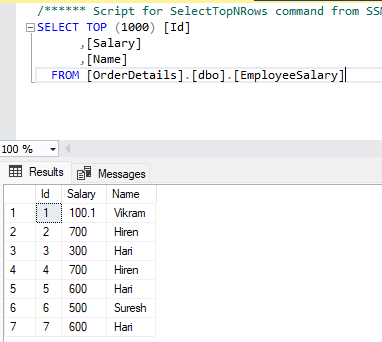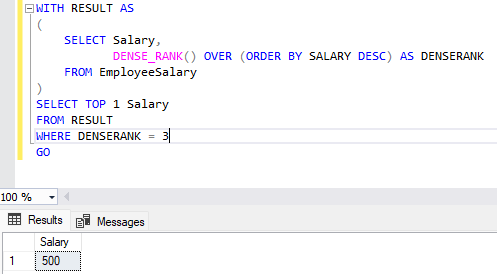One of the common SQL question is how to find Nth highest salary in SQL Server or how to find 3rd highest salary from a employee table in SQL Server, so in this article, I have mentioned how we can find nth highest salary in SQL Server.
Suppose, we have below given SQL Server table

You can also create sample database in your local SQL using below SQL Script
CREATE TABLE [dbo].[EmployeeSalary](
[Id] [int] NOT NULL,
[Salary] [float] NULL,
[Name] [varchar](100) NULL,
CONSTRAINT [PK_EmployeeSalary] PRIMARY KEY CLUSTERED
(
[Id] ASC
)WITH (PAD_INDEX = OFF, STATISTICS_NORECOMPUTE = OFF, IGNORE_DUP_KEY = OFF, ALLOW_ROW_LOCKS = ON, ALLOW_PAGE_LOCKS = ON, OPTIMIZE_FOR_SEQUENTIAL_KEY = OFF) ON [PRIMARY]
) ON [PRIMARY]
GO
INSERT [dbo].[EmployeeSalary] ([Id], [Salary], [Name]) VALUES (1, 100.1, N'Vikram')
INSERT [dbo].[EmployeeSalary] ([Id], [Salary], [Name]) VALUES (2, 700, N'Hiren')
INSERT [dbo].[EmployeeSalary] ([Id], [Salary], [Name]) VALUES (3, 300, N'Hari')
INSERT [dbo].[EmployeeSalary] ([Id], [Salary], [Name]) VALUES (4, 700, N'Hiren')
INSERT [dbo].[EmployeeSalary] ([Id], [Salary], [Name]) VALUES (5, 600, N'Hari')
INSERT [dbo].[EmployeeSalary] ([Id], [Salary], [Name]) VALUES (6, 500, N'Suresh')
INSERT [dbo].[EmployeeSalary] ([Id], [Salary], [Name]) VALUES (7, 600, N'Hari')
GO
Now let's take a look at how to find Nth Highest salary in SQL Server
Get 2nd Highest Salary in SQL Server
We will start with the simple query to get 2nd highest salary in SQL Server
Where we have 2 queries, query inside query
select (SELECT MAX(Salary) FROM EmployeeSalary
WHERE Salary
NOT IN
(SELECT MAX(Salary) FROM EmployeeSalary )) as [2nd_max_salary]Output, considering above table
2nd_max_salary
--------------
600In the above query, inner query is selecting maximum employee salary then outer query select salary highest other than inner query result, making it as second highest salary.
Get 3rd Highest Salary in SQL Server using Dense_Rank()
One of the easiest way to get 3rd Highest salary in SQL Server is using Dense_Rank() and CTE
WITH RESULT AS
(
SELECT Salary,
DENSE_RANK() OVER (ORDER BY SALARY DESC) AS DENSERANK
FROM EmployeeSalary
)
SELECT TOP 1 Salary
FROM RESULT
WHERE DENSERANK = 3
GOOnce you will execute above code, output would be as below

3rd Highest or Nth highest Salary using Distinct
If the above Dense_Rank() based solution looks difficult, we can also use Distinct keyword to get nth highest salary, syntax of query will be as below
SELECT salary
FROM EmployeeSalary e1
WHERE N-1 = (SELECT COUNT(DISTINCT salary) FROM EmployeeSalary e2
WHERE e2.salary > e1.salary)Where N is the number for which you need record.
For example, 3rd highest salary query would be as below
SELECT salary
FROM EmployeeSalary e1
WHERE 3-1 = (SELECT COUNT(DISTINCT salary) FROM EmployeeSalary e2
WHERE e2.salary > e1.salary)Output:
salary
------
500As 2nd highest salary can have multiple records, so considering above syntax query would be as below
SELECT Name,salary
FROM EmployeeSalary e1
WHERE 2-1 = (SELECT COUNT(DISTINCT salary) FROM EmployeeSalary e2
WHERE e2.salary > e1.salary)
Output:
Name salary
------------------
Hari 600
Hari 600The distinct keyword is there to deal with duplicate salaries in the table.
But this approach is slower than above Dense_Rank one as the inner query will run for every row processed by the outer query.
You may also like to read:
How to Select LAST N Row in SQL Server
Extract String after a character or before character in SQL Server
Convert Int To String (varchar) in SQL Server
If-Else in SQL Server with Example
Find Duplicate Rows in SQL Server
Change theme in SQL Server Management Studio (SSMS, Dark Mode)
